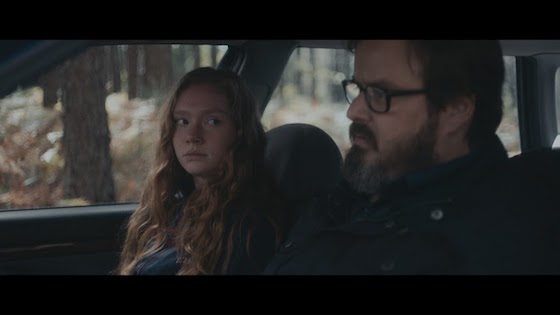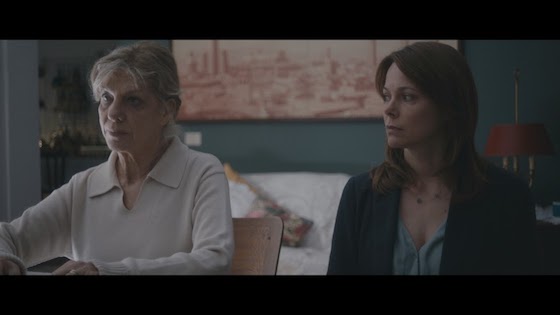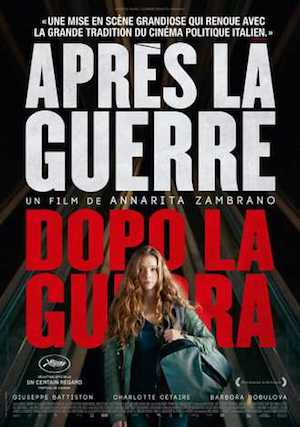[Rating: Solid Rock Fist Up]
When people wage war, there are consequences that reverberate not just through a soldier and their conflict, but also in the rippling aftershocks that tremble out and away from that individual and place. Whether it is PTSD, the refugees that spill out of war zones, shattered families, or economies that have to readjust from a war-footing, conflicts produce more casualties than what is found in cratered landscapes and flag-draped caskets. After the War (Italian: Dopo La Guerra) examines this tragic reality in the more modern context of terrorism and insurgency, taking an honest look at the consequences of youthful revolution for those “lucky” enough to survive and retire from it.
After the War opens in Bologna, Italy in 2002. Political and social unrest over the country’s increasing modernization and tax code reformation has enflamed tensions, leading to the shocking assassination of a judge in broad daylight. A newly formed group of political terrorists claims responsibility for the murder, claiming the name of a long-defunct revolutionary group from over twenty years earlier. This puts heat on the former leader of that terrorist cell, who had nothing to do with this recent killing, but is now a very sought-after individual regardless.
This former revolutionary, Marco Lamberti (Giuseppe Battison), has been living peacefully in France for the last twenty years, sixteen of them with his teenage daughter, Viola (Charlotte Cetaire). Although Marco had enjoyed amnesty in Paris owing to a Presidential decree protecting Italian political refugees, this deal has expired, leaving the famous-again Marco in a precarious position. And while Marco knows what must be done, packing in an instant to go into hiding in the south of France, Viola is less understanding.
 Yet it’s not just Viola who has to suffer for Marco’s past sins. Back in Italy, Marco’s sister, mother, and brother-in-law are feeling the consequences of the renewed attention as well. Anna (Barbara Bobulova), a well-meaning Literature teacher, hasn’t seen or spoken to her brother Marco in two decades, yet that doesn’t matter much to the parents of her students, who threaten to pull their kids out of her class if she isn’t removed from her post. The family’s elderly matriarch survives an assault shaken but okay, while Anna’s husband, Ricardo (Fabrizio Ferracane), is likewise targeted for his tangential association with Marco, despite the fact that the two have never met.
Yet it’s not just Viola who has to suffer for Marco’s past sins. Back in Italy, Marco’s sister, mother, and brother-in-law are feeling the consequences of the renewed attention as well. Anna (Barbara Bobulova), a well-meaning Literature teacher, hasn’t seen or spoken to her brother Marco in two decades, yet that doesn’t matter much to the parents of her students, who threaten to pull their kids out of her class if she isn’t removed from her post. The family’s elderly matriarch survives an assault shaken but okay, while Anna’s husband, Ricardo (Fabrizio Ferracane), is likewise targeted for his tangential association with Marco, despite the fact that the two have never met.
After the War proceeds thus, with the story jumping back and forth between France and Italy, examining the collateral damage of Marco’s decisions from a lifetime ago. As the movie see-saws between Marco and Viola’s story, and the drama playing out back in Italy with Anna et al, the thematic threads begin to take shape. This is a movie about the marriage of personal and state responsibility, and what each side owes to the other. Marco is admittedly self-involved, and lacks the compassion his daughter demands in this scary new phase of their life, but he’s also honest with himself, and anyone who comes calling.
During an interview with a reporter, Marco explains that while he regrets the position he finds himself in, he’s not going to apologize for the past. A terrorist, to be sure, yet Marco views the conflicts of his earlier years within the context of a war, with casualties mounted high on both sides. Like any normal soldier, once the conflict was lost, Marco left that world behind, and feels entitled to the peaceful life he’s pursued since. It is an understandable position to take, yet co-writer/director Annarita Zambrano doesn’t let Marco off that easily. During this same interview, the audience learns that Marco did some pretty awful shit back in the day, shit that can’t be hand-waved away by the standard wartime rules of engagement. When Viola confronts her father about this, asking him why he crossed these lines, an answer isn’t forthcoming, making for one of the best scenes of the picture.
 How does a country come to terms with the sins of its past, both for its own actions, and for the enemies of the state it battled? What do the insurgents owe their oppressors once a fight is lost (obedience, exile, imprisonment, death?), and what does a state owe its people when attempting reconciliation both for the actors and those close to them? After the War explores this within the framework of Marco’s deteriorating relationship with his daughter, and in the aftershocks felt by his family far away in Italy, yet never in a way that feels forced, or owing to a specific archetype or trope.
How does a country come to terms with the sins of its past, both for its own actions, and for the enemies of the state it battled? What do the insurgents owe their oppressors once a fight is lost (obedience, exile, imprisonment, death?), and what does a state owe its people when attempting reconciliation both for the actors and those close to them? After the War explores this within the framework of Marco’s deteriorating relationship with his daughter, and in the aftershocks felt by his family far away in Italy, yet never in a way that feels forced, or owing to a specific archetype or trope.
Zambrano does a masterful job setting all of this up by making full use of a subdued script and thoughtful scene compositions. The truth of Marco’s past and of his current predicament come in pieces, and through the furtive glances Viola shoots out the windows, or around a messy kitchen devoid of food. It’s clear early on that Marco didn’t account for how this sudden run on the lamb would affect his daughter, and these silent moments say a lot about unseen consequences of monumental decisions that reverberate for decades.
How Zambrano uses wardrobe, space, and her settings also points to a thoughtful and deliberate approach to the material. Viola, Anna, and Ricardo most frequently appear on-screen in tight quarters, narrow hallways, or confined/crowded spaces. This, juxtaposed against the wide-open places Marco seems to always find himself in, speak to a subtle commentary on who is really free, and who isn’t. What’s more, Viola’s clothing choices, hinting at her rapidly emerging womanhood, also speak to a child who is setting land-speed records moving between adolescence and adulthood as a result of her father’s actions.
Playing May 18th, 19th, and 26th at the Seattle International Film Festival, After the War is a thoughtful exploration of the consequences of conflict in the modern age, and the way people and their countries attempt to heal after a conflagration. A bit sparse in spots by design, the movie is nonetheless a timely drama for a world with more than a few civil conflicts now in full swing.







Comments on this entry are closed.